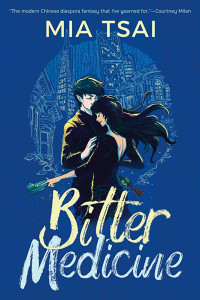 Mia Tsai’s Bitter Medicine is called, in at least some of the advertising, a contemporary fantasy. While this is technically true, technology like phones and computers feeling more than familiar, it is possibly better fit into another genre. Specifically, it fits the Paranormal romance genre to a T.
Mia Tsai’s Bitter Medicine is called, in at least some of the advertising, a contemporary fantasy. While this is technically true, technology like phones and computers feeling more than familiar, it is possibly better fit into another genre. Specifically, it fits the Paranormal romance genre to a T.
Ella is a mage using ink to craft a variety of potions, sigils, and other useful magical items. While trying to focus on her work she also balances helping her brother Tony live his life and generally forgets herself a fair bit of the time. Well they don’t always get along they hang on to each other, largely due to an incident in their past that pulled them away from their family.
Luc is a security agent who had his life saved by Elle in the past. From his first appearance it’s obvioius the man is interested in her. He is a half elf and pretty consistently abused by his boss, Oberon. Whether that name is supposed to imply he’s the mythological figure, or merely reusing a cool sounding name, is of little importance to the story.
The romance between these leads is the primary plot, and every other plot carefully interweaves in a way to support or be supported by it. There are multiple moderately explicit sex scenes. They are consensual, overall very forward thinking, and not likely to offend if one goes in expecting them or merely understanding the tone of the book they are getting into. This is not to say that the family drama and workplace abuse plots are not important – they’re both masterfully written – but merely to point out each of them circles the main story and that is the romance of these two individuals.
Multiple mythologies were combined in this book, to overall good effect. Areas where there are similarities are discussed in brief, and the fact that western and eastern ideas can interact with possible positive results is a good idea to be pushed forward. In general most cultures are given respect, although the occasional French joke is made at the expense of Luc in a friendly or even flirtatious manner.
Truenaming, or an equivilent, is a major feature of the setting’s magic. While far from the primary Supernatural aspect, its use fuels some of the major conflicts of the book while also serving as an excellent metaphor for abusive families and workplaces.
While being too selfless as a flaw is often a sign of bad storytelling, it is handled fairly well here. The various levels of guilt and attachment that Ella expresses in subtle and more overt moments help show her as a believable individual simply concerned for those she cares about. This aspect also makes one of the two plot lines work much better, as it explores the emotional ramifications of her past even as other aspects of it intrude upon her present life.
This is a book that could easily be called a paranormal romance, the chief reason not to would seem to be either author choice or a risk of limiting the audience. Both are understandable. It is one of the better contemporary fantasies to be a recent release, exquisitely structured and thought out. One looks forward to seeing what else this author has in store.
(Tachyon, 2023)
